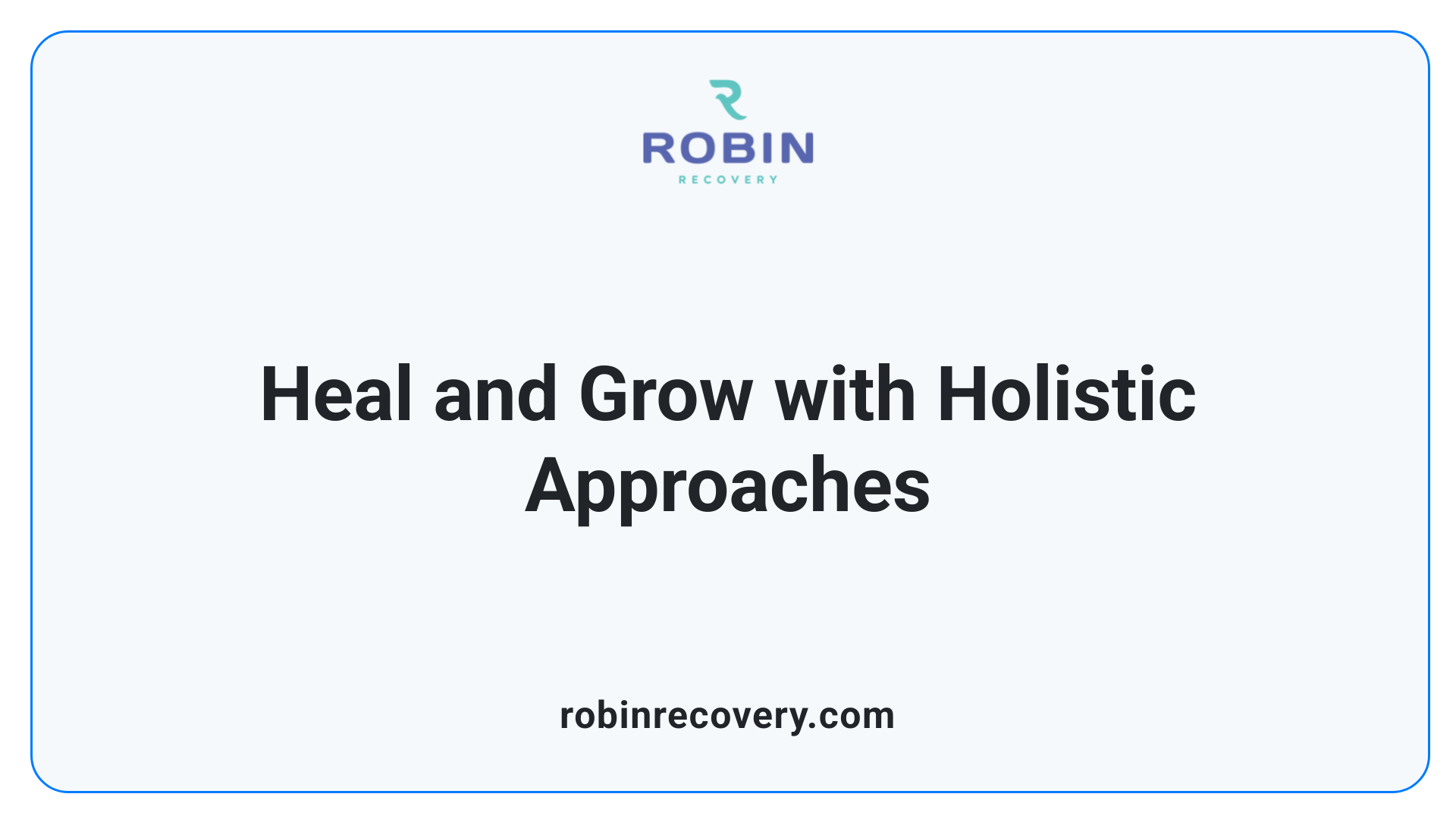How to Build a Life of Meaning Beyond Addiction

Embarking on a journey of meaningful living after overcoming addiction
Recovery is more than abstaining from substances; it is about rediscovering oneself and building a life filled with purpose, growth, and connection. This process involves understanding deeply personal values, exploring holistic healing practices, and setting a clear path toward long-term fulfillment. In this article, we explore comprehensive strategies that empower individuals to craft a purposeful life beyond addiction, highlighting the importance of self-awareness, holistic approaches, goal setting, and community support.
Understanding the Foundations of a Meaningful Life in Recovery

What does a meaningful life look like after overcoming addiction?
A meaningful life in recovery goes beyond simply avoiding substances. It involves creating a sense of purpose, fostering emotional well-being, and building fulfilling relationships. Individuals often find joy in pursuing passions, engaging in community activities, and developing new interests that align with their core values.
Recovery is also about reconnecting with one’s true self, discovering personal gifts, and cultivating a balanced life. Achieving this helps individuals feel alive, motivated, and resilient as they navigate their new path.
Why is rebuilding identity and purpose essential in recovery?
Addiction can severely impact a person’s sense of identity and purpose, leaving feelings of what might be described as lostness or emptiness. Rebuilding this sense of self is critical because it restores confidence and gives direction.
Having a purpose provides motivation to persevere during challenging times, offers a framework for setting goals, and strengthens emotional resilience. It encourages reflecting on personal passions, values, and life aspirations, which in turn guides choices and behaviors that support sustained sobriety.
How do personal growth and self-discovery contribute to recovery?
Growth and self-discovery are ongoing processes that shape a fulfilling life beyond addiction. They involve honest self-reflection to understand one’s desires, beliefs, and values.
Activities such as exploring new hobbies, reconnecting with old passions, volunteering, or practicing mindfulness help uncover strengths and foster a sense of achievement.
Over time, these journeys of self-awareness lead to a deeper understanding of what truly matters, enhancing self-esteem and confidence. This continuous evolution supports long-term recovery by encouraging individuals to adapt, learn, and embrace their unique path toward a life filled with purpose and joy.
Aspect Description Importance in Recovery Identity rebuilding Reconnecting with inner self and personal values Restores confidence, provides direction Purpose Setting meaningful goals and engaging in passions Motivates perseverance, reduces relapse risk Personal growth Self-discovery through reflection, learning, and new experiences Builds resilience, enhances mood and self-esteem Activities that foster purpose Volunteering, hobbies, community involvement Creates a sense of belonging and accomplishment
An integrated approach to recovery places emphasis on developing a purposeful and balanced life. This fosters not just sobriety but also personal fulfillment and happiness.
Holistic Healing: Integrating Mind, Body, and Spirit

How can approaches to recovery incorporate personal growth, self-discovery, and holistic healing?
Recovery is more than just abstaining from substances; it involves nurturing every aspect of a person's being—physical, emotional, mental, and spiritual. Holistic healing approaches focus on creating a balanced, fulfilling life by addressing these interconnected facets.
Therapies such as yoga, meditation, acupuncture, and art therapy are frequently used to support recovery. These practices help regulate emotions, reduce stress, and foster a sense of spiritual connection and inner peace. For example, yoga enhances physical strength while promoting mindfulness and emotional resilience.
Mindfulness and meditation are particularly effective for emotional regulation. They teach individuals to observe their thoughts and feelings without judgment, which can reduce cravings and prevent relapse. These techniques cultivate self-awareness, clarity, and the ability to respond thoughtfully to life's challenges.
Complementing traditional treatments like counseling or medication, holistic practices create a comprehensive, tailored plan for healing. This combined approach allows individuals to explore their inner selves, confront past pain, and develop resilience.
Incorporating holistic therapies encourages personal growth by helping individuals discover their passions, values, and purpose. The overall goal is to nurture a deeper understanding of oneself, which supports sustainable change and emotional well-being.
By blending these practices, recovery becomes a journey of self-discovery and empowerment. It transforms the experience from merely stopping substance use to building a vibrant, balanced life rooted in health and purpose.
Effective Goal-Setting and Motivation Strategies

What are effective methods for setting goals, maintaining motivation, and achieving lasting change after addiction?
Achieving long-term recovery involves more than just stopping substance use; it requires setting purposeful goals and staying motivated through meaningful routines. One highly effective approach is using SMART goals—specific, measurable, achievable, relevant, and time-bound. This framework helps individuals create clear, realistic targets that build confidence and provide a roadmap for progress.
Alongside structured goal-setting, establishing small milestones is crucial. For example, attending therapy sessions, practicing stress management techniques, or engaging in healthy activities like exercise or meditation serves as tangible steps toward larger goals. Celebrating these small victories fosters a sense of achievement and keeps motivation alive.
Developing supportive daily routines and seeking accountability from support networks, such as groups, sponsors, or trusted friends, significantly enhances commitment. Regular check-ins and shared goals create an environment of encouragement and responsibility.
Recovery is not a straight path, and setbacks are common. When they occur, practicing self-compassion and flexibility helps maintain resilience. Reframing setbacks as opportunities for learning and adjusting plans accordingly prevents discouragement. This adaptive mindset supports sustained motivation and progress.
Overall, combining structured goal-setting with consistent routines, community support, and resilience fostered through kindness and flexibility creates a sturdy foundation for lasting change after addiction.
The Power of Purpose and Values in Sustaining Recovery
What role do purpose and values play in the recovery process and in achieving long-term fulfillment?
Purpose and personal values serve as foundational elements in the journey toward lasting recovery. They offer individuals a clear sense of direction and meaning, especially during challenging moments when temptations or setbacks may occur.
Having a strong sense of purpose helps foster resilience—the capacity to bounce back from difficulties—by reinforcing the reasons for staying sober. It provides emotional stability, giving individuals the motivation to persevere through tough times and setbacks.
Engaging with passions, pursuing spiritual or community involvement, and helping others are ways to deepen one's sense of purpose. These activities not only cultivate a feeling of belonging but also add layers of fulfillment to everyday life.
Aligning actions with core beliefs is essential for sustaining recovery. When behaviors reflect one’s values, the connection to long-term goals becomes more authentic and reinforced. This alignment makes it easier to resist influences or environments that threaten sobriety.
Ultimately, purpose and values help individuals forge meaningful relationships, foster personal growth, and develop a sense of identity beyond addiction. This holistic approach creates a resilient and fulfilling life that resonates with one’s true self, reducing the likelihood of relapse and encouraging ongoing happiness.
Holistic Practices That Cultivate Mindfulness and Emotional Balance

What holistic practices, such as yoga and meditation, support meaningful living beyond addiction?
Holistic approaches like yoga, meditation, acupuncture, and art therapy play a significant role in supporting a fulfilling life after addiction. These practices foster emotional regulation by helping individuals stay grounded and present. Techniques such as mindfulness exercises and grounding techniques are effective in cultivating present-moment awareness, which is essential for reducing cravings and managing stress.
Physical activities such as yoga and regular exercise improve overall health and promote emotional stability. They release endorphins, enhance physical well-being, and build resilience against setbacks.
Creative therapies, including art and music therapy, offer outlets for emotional expression and healing. Engaging in these artistic pursuits can deepen self-awareness and help process complex feelings.
Incorporating these holistic practices into a personalized recovery plan provides ongoing support for emotional health. They not only aid in managing triggers but also enrich the journey of long-term wellness, helping individuals find joy, purpose, and balance beyond their past dependence.
Such practices align with an overall goal of creating a meaningful life that embraces emotional well-being, spiritual growth, and resilience. They are valuable tools for building a sustainable, joyful future in recovery.
Transitioning to a Purpose-Driven Life Post-Recovery

How can individuals overcome substance use issues and create a fulfilling, purpose-driven life after recovery?
Building a life centered around purpose after overcoming addiction involves more than just abstaining from substances. It requires a conscious effort to rebuild relationships, discover new interests, and give back to the community.
Rebuilding relationships is often a foundational step in creating a meaningful life. Recovery provides an opportunity to reconnect with loved ones, establish healthy boundaries, and foster honest communication. These strengthened bonds contribute to emotional stability and provide a support network essential for ongoing resilience.
Exploring new passions and interests is equally vital. Engaging in hobbies such as creative arts, outdoor pursuits like hiking or scuba diving, and learning new skills can bring joy and a sense of accomplishment. These activities help fill the void that substance use might have occupied, reducing boredom and stress, and encouraging personal growth.
Giving back through service offers a profound sense of purpose. Volunteering, mentoring others, or participating in community projects can foster connection, boost self-esteem, and reinforce a positive identity beyond addiction. Acts of kindness and service cultivate gratitude and empathy, which are crucial for long-term recovery.
To support this transition, individuals should maintain personalized recovery plans that focus on managing triggers and practicing self-compassion. Cultivating habits like gratitude, mindfulness, and regular self-care deepens emotional resilience.
In sum, creating a purpose-driven life after recovery involves rebuilding relationships, discovering new passions, and community involvement. These steps promote not only sobriety but also a fulfilling, vibrant life rooted in health, connection, and personal growth.
Building Self-Awareness and Spiritual Connection for Lasting Fulfillment
Why are self-awareness, spiritual practices, and personal development important in building a meaningful life after addiction?
Recovering from addiction is much more than abstaining from substances. It involves creating a life that feels intentional, authentic, and fulfilling. Developing self-awareness allows individuals to understand their triggers, motivations, and core values. This understanding helps to avoid relapse and live in alignment with one’s true self.
Spiritual practices such as meditation, prayer, or gratitude can foster a sense of inner peace and connection to a higher purpose. These activities often provide comfort and resilience during tough times, reinforcing the motivation to stay sober.
Engaging in personal growth through activities like therapy, support groups, or service helps rebuild confidence and emotional stability. When people connect with their spirituality and invest in self-awareness, they cultivate compassion, responsibility, and honesty. This holistic approach supports healing past wounds and practicing living with integrity.
Ultimately, integrating these elements creates a foundation of hope and perseverance. A life built on purpose, inner peace, and authentic living offers a sustainable path beyond addiction. Such a journey leads to resilience, deeper connections with others, and a sense of fulfillment that lasts beyond initial recovery.
Continuing the Journey Toward a Fulfilled Life
Building a life of meaning beyond addiction is an ongoing, dynamic process. It requires patience, openness to change, and a commitment to continual self-discovery. By integrating holistic practices, setting purposeful goals, aligning with core values, and fostering community connections, individuals can create a resilient foundation for long-term fulfillment. Remember, recovery is not just about avoiding substances—it's about reclaiming your identity, discovering your passions, and living intentionally. Embrace the journey with compassion and curiosity, knowing that each step forward is a movement toward a richer, more meaningful existence.
References
- Long-Term Recovery: Building a Life Beyond Addiction
- Living A Life Beyond Addiction - Anchored Tides Recovery
- The Beyond Addiction Workbook for Family and Friends: Evidence ...
- Identity Beyond Addiction: Creating a Life That Makes You Feel Alive
- The Power of Purpose: How to Find Meaning Beyond Addiction
- Finding Purpose and Meaning: Building a Fulfilling Life After Addiction
- Reborn in Recovery: A New Life Beyond Addiction
- Beyond Addiction: The Journey of Finding Purpose in Recovery
- Life After Addiction: Habits For Purpose & Fulfillment
